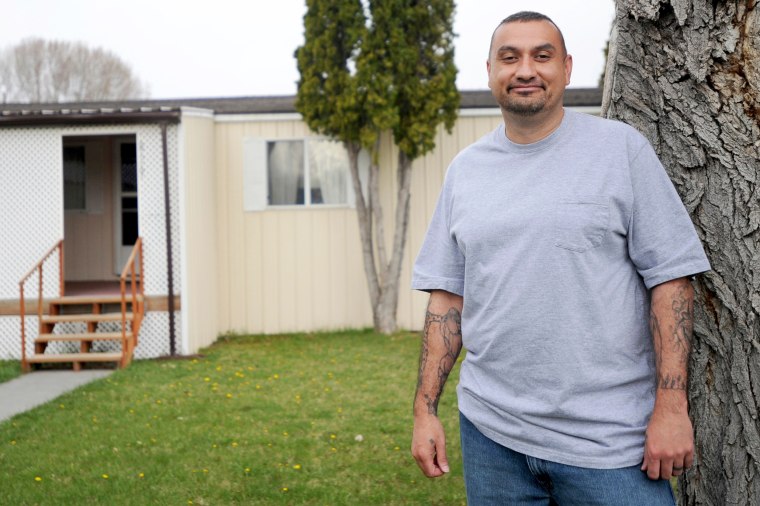In September, Chris Tapp recorded an interview with “Dateline” at his Idaho home.
He had served 20 years in prison for a crime he didn’t commit, and the interview was the last time he planned on publicly discussing the 1996 murder of his friend Angie Dodge — the 18-year-old Idaho woman whom Tapp was wrongfully convicted of killing.
Tapp didn’t want to be remembered as the man from the Angie Dodge case, he said, but rather as an advocate — someone who, after his 2019 exoneration, pushed lawmakers in his state and others to provide fair compensation to people who have been wrongfully convicted.
“I have to move forward,” he said.
But what came next was “incomprehensible,” as a local journalist put it.
For more on the case, tune into "True Confession" on "Dateline" at 9 ET/8 CT tonight.
Six weeks after the interview, Tapp, 47, died after he was rushed to a hospital from his Resorts World suite in Las Vegas, a spokesperson for Tapp’s family told “Dateline.” His death was initially described as an accident, the Las Vegas Metropolitan Police Department said, but the Clark County Coroner’s Office later ruled it a homicide.
Authorities have released few details on the incident. No suspects have been publicly identified, and the department has not discussed a possible motive.
To George Pahis, who knew Tapp for three decades, the arc of his close friend’s life was tragic: He’d gone from “failing through life” as a kid to losing 20 years behind bars. Then, he’d been “gifted” a new life and was living free from worry, Pahis said.
“Chris’ life being cut short is the exact opposite of what anyone expected from Chris,” Pahis told “Dateline.”
“Chris had expectations. Chris had dreams. Chris had ideas of what he was gonna do for the rest of forever. And it was taken from him,” Pahis said.
Confessing under pressure
Tapp was charged with first-degree murder in February 1997, roughly eight months after Dodge’s body was discovered in her Idaho Falls apartment. She had been raped and nearly decapitated, authorities said.

Tapp and Dodge were part of a group that often hung out by the Snake River, and he initially told police that he didn’t know anything about the crime, interview transcripts show. But after multiple polygraph tests and additional interviews with investigators, Tapp — then 20 — confessed to participating in the rape and murder and implicated two other “River rats,” as the group was known, the transcripts show.
One of the friends was accused, though the charges were later dismissed, according to an account of Tapp’s case in the University of Michigan’s National Registry of Exonerations. A jury convicted Tapp in 1998, and he was sentenced to 40 years in prison.
In 2012, Tapp told “Dateline” that when he offered his false confession, he’d only been trying to appease police and tell them what he believed they wanted to hear. By then, the Idaho Innocence Project had taken up his case, and Dodge’s mother had come to believe the man who had been convicted of killing her daughter was likely innocent.
When Carol Dodge watched videos of Tapp’s interrogation, there were times when “I wanted to put my fist through the TV,” she told “Dateline.”
When Tapp appeared to know little about Dodge’s apartment, for instance, she was stunned to see investigators show him crime scene images. Steve Drizin, a clinical professor of law at Northwestern University and co-director of the Center on Wrongful Convictions, reviewed videos of the confession at Carol Dodge’s request and told “Dateline” it was the “worst example of police contamination” and “fact-feeding” that he’d ever seen.
In an interview with “Dateline,” the investigators denied feeding Tapp details of the crime. But in 2017, after Tapp’s lawyer alleged that his client had been coerced, the prosecutor’s office reached an agreement to vacate Tapp’s rape conviction and reduce the sentence in his murder conviction to time served, according to the registry.
A DNA match
Tapp was still guilty of murder, according to the terms of the agreement, but the deal meant he could be released from prison.
“That was one of the hardest decisions of my life, to continue to have to say I was convicted of a first-degree murder I know I didn’t do,” Tapp told “Dateline.” But “I had to move on with my life. And that was the only opportunity I had so I took it with the best ability that I had.”

By 2019, the rest of Tapp’s conviction had been erased. DNA found on Dodge’s body linked another suspect to the killing and a witness — who had said she’d heard Tapp admit to the crime — recanted her testimony, saying authorities had pressured her to lie. (Authorities denied the witness’ allegation, which was included in a federal lawsuit Tapp later filed against the city of Idaho Falls.)
On May 15, 2019, a man who’d been a neighbor of Angie Dodge, Brian Dripps, was arrested and charged in the murder. He later pleaded guilty and was sentenced to 20 years to life in prison. Two months after Dripps’ arrest, a judge declared Tapp innocent of all charges and exonerated.
“I don’t think any of us can really put ourselves in your place,” the judge told the courtroom. “But I’m just glad that that can be corrected at this time.”
Starting fresh
Tapp described his experience after prison as overwhelming. Seeing the courthouse filled with supporters, getting a cellphone, choosing which underwear to buy — he wasn’t used to any of it. The first time he went shopping, Tapp said, “I had to run out of the store cause I couldn’t handle it all.”
Still, he started settling into a new life. He started working at a bag-making factory, bought a home, got married and saw old friends. He lobbied Idaho’s governor to sign a bill providing compensation to the wrongfully convicted, and in 2021 that bill became law, providing $62,000 for each year a person was incarcerated and $75,000 annually for people who had been on death row.
Other 'Dateline' cases
- Murder suspect paid $120,000 to his lawyer who relied on Google during trial
- Before a California bomber killed his ex-girlfriend, his wife died a 'mysterious' death, officials say
- A decades-old killing and two murder trials divided juries — and a family
- A secret room and a jarring first date: Gilgo Beach murders suspect set off alarm bells
- A killer known for his ‘zombie hunter’ costume is on death row, but some suspect he has another victim.
- His wife was killed the day before their eviction. A decade later, he faced another foreclosure — and a murder charge.
- After a woman was found dead in the woods, Ohio relied on a well-known forensics expert in the murder case. Was it the right call?
- Days before her death, a Wisconsin woman sent an ominous letter: ‘He would be my first suspect’
For Tapp, that meant $1.2 million — a sum he said was “greatly appreciated and needed.”
This advocacy became a mission for Tapp after his release, his lawyer, John Thomas, told “Dateline.” Tapp traveled the country, Thomas said, speaking at legal seminars and working with legislators.
In Oregon, he pushed lawmakers to pass a similar compensation bill to Idaho’s. In 2022, Oregon’s governor signed it into law.
Tapp had also filed the federal lawsuit against Idaho Falls and its police department alleging “egregious misconduct,” and in 2022 the city settled, approving a settlement of $11.7 million. The mayor issued a formal apology for the “harm and damages” done to Tapp.
Tragedy strikes
The following year, Tapp’s marriage ended in tragedy. In August, as the couple was divorcing, his wife died in a car crash while driving a Corvette he’d recently bought her with settlement money, he said.
The tragedy was compounded when, two months later, Tapp visited Las Vegas for a car show. His lawyer said he learned from Tapp’s mother that he’d been hospitalized and was in a coma after tripping, falling and hitting his head on a coffee table in his hotel suite.
“It was devastating to hear that because it seemed so mundane,” Thomas said.
About two months later, Las Vegas police said medical personnel had found Tapp on Oct. 29 suffering injuries that were the result of a “purported accident.”
But homicide detectives learned that prior to Tapp’s death, he’d been in a fight inside a hotel room. The coroner’s office ruled that he died as a result of blunt force trauma to the head, the department said.
A department spokesperson said no additional details about Tapp’s death were available.
Thomas, who said he’s acting as a liaison between Las Vegas police and Tapp’s mother, said he’s aware of an ongoing investigation into Tapp’s death but he hasn’t reviewed the autopsy and he declined to comment further.
To Nate Eaton, news director of the East Idaho News who has covered Tapp’s case for years, the development was unimaginable.
“I don’t know if there’s a way to make sense of any of this,” he told “Dateline.” “It’s just so incomprehensible.”
